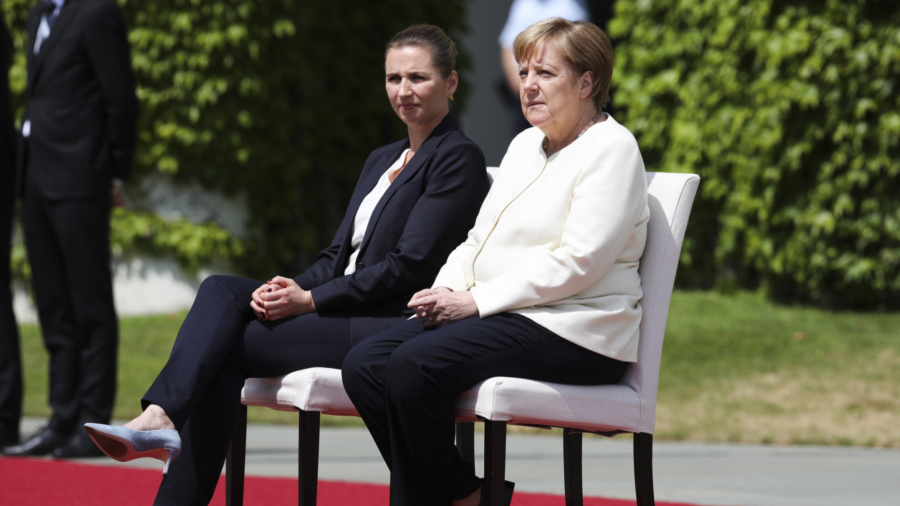BERLIN—German Chancellor Angela Merkel and the visiting Danish prime minister sat through their countries’ national anthems at a ceremony in Berlin on July 11, a day after Merkel shook as she stood at a similar event in the latest of three incidents that have raised concern about her health.
Merkel showed no signs of unsteadiness or other ill-health as she sat alongside new Prime Minister Mette Frederiksen outside the chancellery in Berlin, an unusual arrangement at a military honors ceremony that appeared aimed at forestalling the possibility of another high-profile episode.
On Wednesday, Merkel shook as she stood alongside Finland’s prime minister at the same spot.
She later suggested that the psychological impact of the first shaking episode in mid-June was responsible for the subsequent incidents, saying that she “will have to live with it for a while” but there’s nothing to worry about. Merkel indicated at the time that the first incident on June 18 may have been caused by dehydration on a hot day.
Public figures’ health is generally regarded as a private matter in Germany and there has been little reason until recent weeks for questions about the health of a leader who has a longstanding reputation for stamina. The country’s privacy laws are very strict on such personal information.
Merkel, who turns 65 next week, also has kept up a full schedule lately, attending a Group of 20 summit in Japan and a marathon European Union summit. On Sunday, she is due to attend France’s annual national day military parade.
At a news conference after Thursday’s meeting with Frederiksen, Merkel sidestepped a German reporter’s question as to whether she has consulted her doctors and, if so, what the results were.

“You can assume that, firstly, I am aware of the responsibility of my office and act accordingly, also as far as my health is concerned,” she replied. “And secondly, you can assume that I also have a great personal interest in being healthy and taking care of my health.”
Asked what her upcoming 65th birthday means to her, a smiling Merkel said that “it means you’re not getting younger, but perhaps more experienced. Everything has its good side.”
All three incidents in which Merkel’s whole body shook in public took place as she stood still without talking, and ended immediately once she started walking. Merkel also has shown no signs of shaking or unsteadiness while standing and talking in parliament or, as at Thursday’s news conference, behind a lectern.

The recent string of incidents has prompted some concern in German media—relatively mild by many other countries’ standards, but somewhat unusual for Germany—about Merkel’s health but isn’t dominating news coverage in the country.
Fellow politicians of all stripes have largely steered clear of the matter or, if they have addressed it at all, expressed support for Merkel’s handling of it.
Simone Peter, a former leader of the opposition Greens, tweeted Thursday of Merkel listening to the anthems in a chair: “that’s completely OK, and the Danish prime minister has the empathy and courtesy to show solidarity.”
“Everyone should do that and recognize that a mega-stressful job can also leave its mark,” she added.
Merkel, who has led Germany since November 2005, said last year that she won’t seek a fifth term as chancellor and won’t seek any other political job after her current term ends in 2021.
She gave up the leadership of her center-right party after a pair of poor state election performances that followed a rocky start to her fourth-term government.
By Geir Moulson

